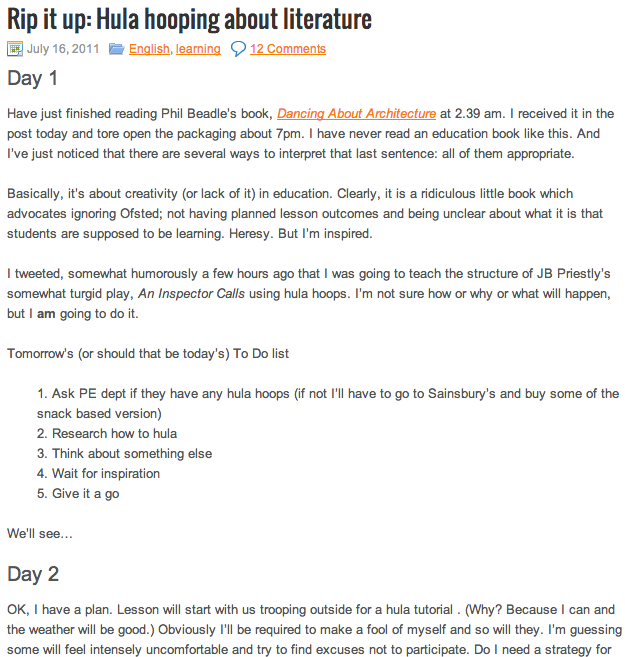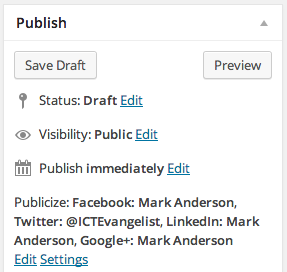
There are many different blogs out there and some people such as @headguruteacher, @learningspy that get hundreds, even thousands of hits every day. These types of blogs are great and help move thinking forward on lots of different levels. Don’t be phased though. Most of us have started our blogging journey as something that is reflective. Something where we discuss the things we’re doing in our lessons and reflect upon them in order to improve our practice. Check this old post from 2011 by David Didau.
Source: http://www.learningspy.co.uk/english-gcse/hula-hooping-about-literature/
Getting up and running with a blog, especially when so many people are doing it right now can seem quite a daunting prospect. Hopefully these following tips will help you get up and running and reflecting on your classroom practice.
1. Do it to help you improve. Start this by putting on the best bits of your practice so that you can improve even further to be the very best you can be at that particular thing. By practicing and reflecting on your ‘bright spots’ (see Switch by Chip & Dan Heath) you’ll have confidence because you’ll already be confident about these, but discussions afterwards in comments will most likely help you to improve even further. As you confidence grows, you can blog about those things which are tougher to discuss publicly.
Find out more about ‘bright spots’ by watching the video below:
2. Do it for yourself. Don’t do it because it’s part of your performance management. Do it because you have time. Do it when you have the time. Do it because you want to.
3. Use a simple to use blogging tool. The most popular are WordPress and Edublogs (both use the WordPress management system) and Blogger by Google. All are free and can get you up and running. Don’t worry about some of these mega blogs that have lots of really cool plugins and what have you. To get up and blogging, all you need is a free blog and away you go. As you get more in to your blog, you can develop it and think about hosting it yourself and developing it further. Most bloggers start with simple blogs:
4. It’s likely that you’re using Twitter. If you are, link your blog up to Twitter so that when you post, it will automatically tweet your blog post. That way, your followers and PLN will know that you’ve blogged. They will then read your post and thus the feedback process starts. If you’re using a WordPress based site then you can use the built in ‘JetPack’ plugin which gives you the option to use a thing called ‘Publicize’. You’ll see it on the top right hand side in your Post section when writing a post.
If you use Blogger there are other ways you can help promote your blog. Use of IFTTT (If this then that) can be set to automatically post a blog post you’ve written on Blogger once you have written it using a recipe such as this one.
5. Beware the troll. In the unlikely event that someone decides to not follow the general ‘kind, specific and helpful’ rules that most education professionals follow and engage in some nasty inflammatory commenting or tweeting; don’t rise to it. Healthy debate is important but don’t rise to their bait. I find this advice and information helpful from the ubuntu forums: http://ubuntuforums.org/showthread.php?t=179139 useful…
My final comment really relates to your own professional identity and safeguarding. Remember, you shouldn’t be taking photographs of your students and posting them on your personal blog. You shouldn’t use student names either and remember that what you’re writing is in the public domain. If in any doubt – refer to your school’s social media policy / e-safety policy / other relevant policy and if in doubt, discuss it with your line manager.
Thanks for reading!



















One Comment